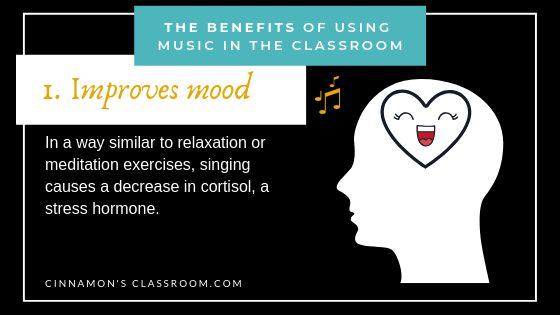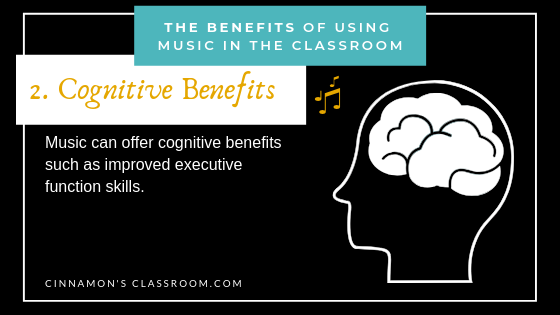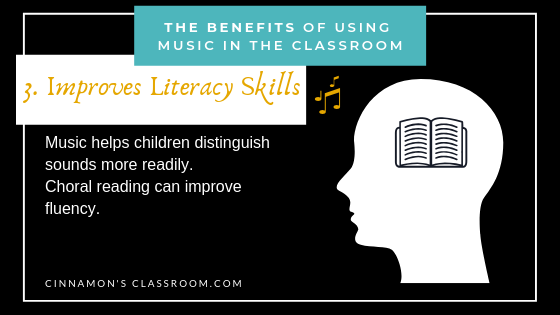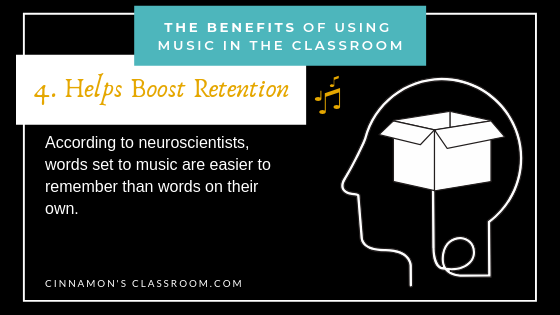The Benefits of Using Music in the Classroom
Music has a way of touching people much more profoundly than just words alone. The rhythm, melody and shared experience of singing together capture our brains and souls. Many teachers use music in the classroom as a technique to bring a fun, enjoyable element to their teaching.
But, singing at school is much MORE than just fun.
Scientific evidence suggests that using music could offer powerful benefits for your students. Here’s why all teachers should consider using music in their classrooms:
Improves Mood

Any teacher knows that when kids are grouchy, stressed, and worried, they often act out. Music can help with this.
According to research published on Harvard’s Health website, singing in a choir can help singers reduce their stress levels and improve their moods. In a way similar to relaxation or meditation exercises, singing causes a decrease in cortisol, a stress hormone. It could be because singing requires you to breathe deeply in a controlled fashion.
Who doesn’t want those benefits in the classroom? Calmer, happier children are more ready to cooperate and learn. All you have to do is incorporate some singing into your daily routines.
Other research shows that musical training may help increase cortical thickness maturation in the brain. This area of the brain is associated with emotion and impulse regulation. So, music might help children maintain a more even-keeled demeanour. If you’re hoping to curb outbursts, music might be the answer!
Cognitive Benefits

Music can offer cognitive benefits such as improved executive function skills.
Executive function skills are essential for kids to develop in order to succeed at school. These skills involve the ability to hold information in working memory, problem solve, control impulses, and exhibit goal-directed behaviour. In other words, executive function allows children to, understand, concentrate on, and work towards completing a task.
This study shows that music training may play an important role in helping kids develop these important executive function skills.
Can Complement Reading and Literacy Skills

Singing together improves skills relevant to reading such as concentration, memory, and focus. Research shows that music awakens children’s ears to pay attention to sounds and distinguish them more readily, even when there was background noise. This may be helpful for improving concentration, but can also be helpful for learning new words.
In addition, singing in a group while also following along with written lyrics offers a fun way to practice choral reading and repeated reading. These are important reading activities that improve fluency and can also build children’s vocabularies.
Why is fluency so important? According to The Literacy and Numeracy Secretariat’s Capacity Building Series, cognitive energy is limited and “Readers need to automate their ability to identify words so that they can direct more cognitive energy to constructing meaning and monitoring and repairing understanding.” Fluency is an important element in creating automaticity.
Helps Boost Retention

Have you ever noticed that it’s easier to remember lyrics than just words on their own? According to neuroscientists, words set to music are indeed easier to memorize than words on their own. This might be because music touches unconscious parts of the brain, or implicit memory, rather than only the conscious mind, which is what you use for recalling words and information not set to music.
So, if you want to make your lessons as effective as possible, set them to music! Create chants, or use Curriculyrics to teach the information you’re hoping your students will retain. For example, if your class is learning about forces, teach them a song about forces!!
Practical Ways to Include Curriculyrics in the Classroom
How can you start using music in your classroom? Whether you use Curriculyrics or fun, silly songs, you can use them regularly in your classroom. Here are some practical ideas for how to include songs in your routines:
- As a hook to a lesson, especially if the song includes information relevant to the topic.
- As a brain break when the class could use some mood regulation.
- At the beginning of the day or end of day so that your students start and end on a high point.
- Integrate it into a literacy block by using songs as an opportunity for choral reading, building academic vocabulary or addressing a topic.
Conclusion
Using music in the classroom, particularly singing together, offers many benefits. From helping your students feel calm and happy to boosting their reading skills, helping them retain information and building impulse control, music boasts many advantages! There’s no reason why you shouldn’t join together in song a few times a day.
So, download those lyrics and sort through song books. Singing could be your next, best classroom idea that will help your students succeed while also having fun.
Check out some of my songs
See more Curriculyrics songs in my shop

